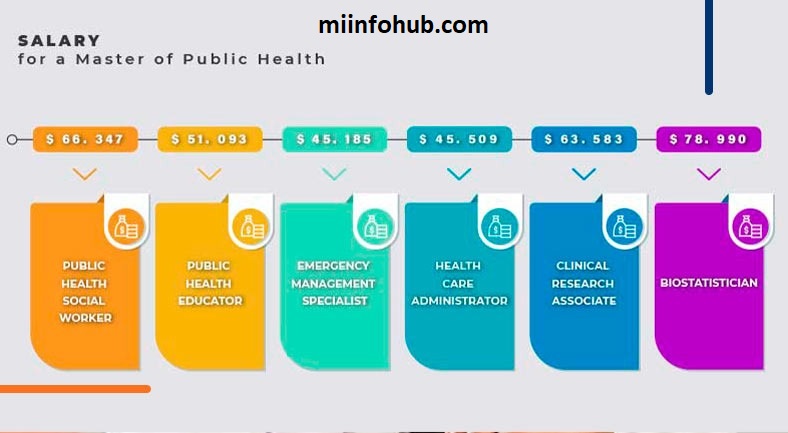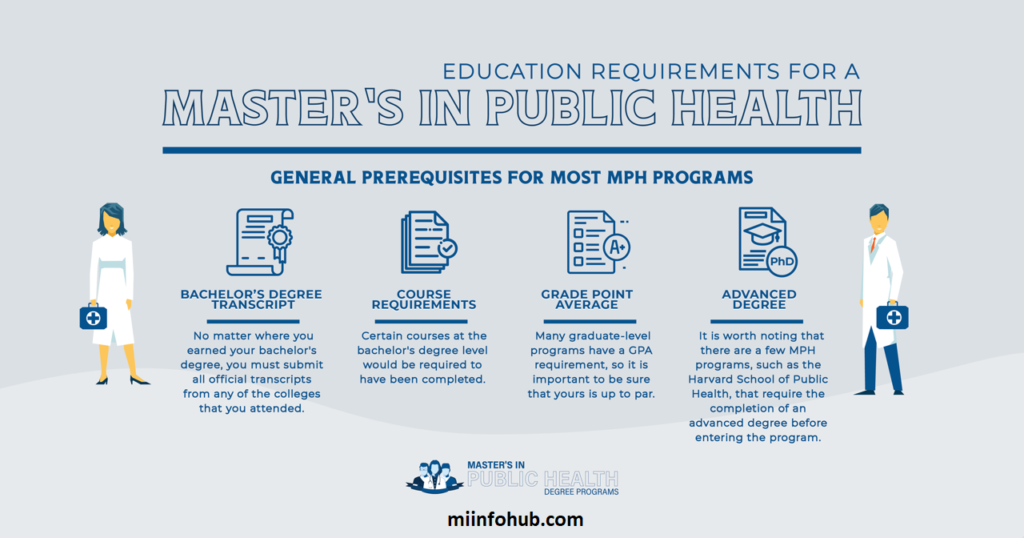A Master’s in Public Health (MPH) opens up diverse career paths in healthcare, government, and non-profit sectors. This degree equips you with skills to address public health challenges globally. Let’s explore what you can do with an MPH degree.

Master’s In Public Health: Work In Public Health Policy
With a Master’s in Public Health, you have the power to shape healthcare policies that impact entire populations. Public health policy professionals work at the intersection of health science, law, and government. You’ll analyze data to identify pressing health issues, such as disease outbreaks, chronic illnesses, and healthcare access disparities. Your job involves assessing risks, such as environmental hazards, and proposing evidence-based solutions.
Additionally, you might work in the private sector. Here, you can influence corporate health policies. Alternatively, you could work for non-profits, focusing on advocacy for vulnerable populations.
Key tasks in public health policy roles include:
- Conducting research and data analysis to inform policy recommendations.
- Collaborating with lawmakers to draft and advocate for public health laws.
- Monitoring the implementation and effectiveness of health regulations.
- Developing communication strategies to inform the public about health risks.
In short, MPH graduates in policy roles drive large-scale change, working behind the scenes to improve health outcomes for millions.
Master’s In Public Health: Become A Public Health Educator
Master’s in Public Health graduates often find rewarding careers as public health educators. In this role, you design and lead programs that educate communities on health, wellness, and disease prevention. You’ll work with diverse populations to raise awareness about important health topics. These topics include nutrition, exercise, mental health, and preventive care. Your efforts will help individuals understand the importance of healthy choices. This knowledge can lead to better health outcomes in the community. Health educators often collaborate with schools, healthcare facilities, and community organizations to create outreach programs that promote healthier lifestyles. If you want to read more and get to know about public health degree then click here.
Your responsibilities might include creating educational materials, hosting workshops, and training volunteers to spread health knowledge. You’ll also assess the effectiveness of your programs, using data to improve future initiatives. Public health educators play a vital role in reducing health disparities. They ensure that underserved communities have access to critical health information.
As a health educator, your goal is to empower individuals. You provide the knowledge they need to make informed health decisions. This effort ultimately improves overall community well-being.

Master’s In Public Health: Research Public Health Issues
If research is your passion, a Master’s in Public Health provides opportunities to work in labs, universities, or government agencies. As a public health researcher, you’ll investigate the causes of diseases, study health trends, and find effective ways to prevent them. Your work might focus on infectious diseases, chronic conditions, or environmental health risks.
In this role, you’ll analyze data, conduct field studies, and collaborate with other health professionals to uncover important insights. Public health research plays a crucial role in guiding policies and interventions. It helps improve community health. Whether you’re studying the spread of a virus, evaluating a public health program, or working on a new vaccine, your research will have a direct impact. It can shape health policies and improve community well-being. Your findings will contribute to effective strategies for disease prevention and health promotion. Your findings can lead to effective strategies that enhance public health outcomes. You will improve health outcomes and help prevent future outbreaks.
This path allows you to contribute to groundbreaking discoveries. Your work provides the scientific foundation for health policies and public health initiatives worldwide.
Manage Healthcare Facilities
Healthcare management is a crucial field where a Master’s in Public Health enables graduates to thrive. With an MPH, you can take on leadership roles in managing hospitals, clinics, or public health departments. Your job will involve overseeing the day-to-day operations of healthcare facilities. You’ll ensure they run efficiently while maintaining high standards of patient care. This includes managing staff, coordinating resources, and implementing policies. Your leadership will help create a positive environment for both patients and healthcare providers.
As a healthcare manager, you’ll handle budgets, coordinate staff, and implement policies that improve service delivery. You’ll also focus on improving patient outcomes by streamlining processes, managing resources, and introducing innovative healthcare practices. This role often requires balancing administrative responsibilities with a deep understanding of public health needs. You must ensure that healthcare systems are both effective and accessible.
By working in healthcare management, you’ll be in a position to shape the future of healthcare services. You will improve patient satisfaction and contribute to the overall health of the community. Your efforts can lead to better health outcomes and a more efficient healthcare system.

Epidemiology Careers
Epidemiologists play a vital role in studying and controlling disease outbreaks. With a Master’s in Public Health, you can enter this field and focus on tracking diseases, analyzing health data, and helping prevent the spread of illness. Epidemiologists investigate patterns and causes of diseases, from infectious outbreaks like COVID-19 to chronic conditions such as diabetes or heart disease.
Your work will involve collecting and analyzing data to identify risk factors, monitor trends, and develop strategies to contain or prevent health issues. You may work for public health agencies, research institutions, or global health organizations. Epidemiologists also communicate their findings to policymakers, healthcare providers, and the public, ensuring that communities are well-informed and prepared.
This career is at the frontline of public health, helping to control and prevent diseases that could affect entire populations. As an epidemiologist, your research and data-driven insights are crucial for improving public health responses and protecting communities from future health threats.
Global Health Specialist
If international health excites you, an MPH offers opportunities to work in global organizations. As a global health specialist, you’ll address health challenges that transcend borders. This role allows you to tackle urgent global health crises, such as epidemics, malnutrition, and access to clean water.
Working with organizations like the World Health Organization (WHO), UNICEF, or Doctors Without Borders, you’ll promote health equity by developing and implementing programs aimed at improving healthcare in underserved areas. Your work might involve coordinating vaccination campaigns, improving maternal and child health, or addressing the spread of infectious diseases.
Global health specialists play a critical role in advocating for vulnerable populations and ensuring that everyone, regardless of where they live, has access to basic healthcare. This career allows you to make a lasting impact on global health systems, advancing health equity on an international scale.

Environmental Health Specialist
Environmental health is an exciting and impactful field for MPH graduates. As an environmental health specialist, you can address critical health concerns related to pollution, climate change, and food safety. Your role will involve investigating how environmental factors—like air and water quality, hazardous waste, and climate conditions—affect human health.
You’ll work to prevent environmental health risks by developing strategies and policies to mitigate these threats. This might include monitoring pollutants, enforcing safety regulations, or educating communities about the dangers of environmental hazards. Your efforts will help ensure that living conditions are safe and conducive to long-term health.
Environmental health specialists often collaborate with government agencies, non-profits, and private organizations to create healthier environments, protect public health, and respond to environmental crises. In this role, you’ll directly contribute to the well-being of populations by making sure their environments are safe and sustainable for future generations.
Biostatistics And Data Analysis
An MPH in biostatistics equips you with essential skills to analyze complex health data. As a biostatistician, you’ll work with public health organizations, hospitals, or research institutions to interpret data related to health trends, disease outbreaks, and treatment outcomes. Your analyses will provide critical insights that guide decision-making.
In this role, you’ll apply statistical models to public health studies, helping identify risk factors for diseases and assess the effectiveness of public health interventions. Biostatisticians play a key role in ensuring that public health policies are based on solid data and scientific evidence. You’ll contribute to everything from clinical trials to public health surveillance systems.
By using data to inform decisions, you’ll help shape policies that improve healthcare services and prevent disease, ultimately leading to better health outcomes for communities. This career blends analytical skills with public health knowledge, making it a vital part of any health-focused organization.

Community Health Worker
MPH graduates can also make a significant impact at the grassroots level as community health workers. In this role, you’ll focus on addressing health disparities by providing care, education, and support to underserved populations. Your work will involve engaging directly with community members to identify their health needs and challenges.
As a community health worker, you’ll organize outreach programs that promote preventive care, nutrition, and healthy lifestyles. You’ll also help connect individuals to healthcare resources, such as clinics, mental health services, and social support programs. Your goal is to empower community members with the knowledge and tools they need to take charge of their health.
This role often requires strong interpersonal skills and cultural competence, as you’ll work with diverse populations facing various barriers to health. By fostering trust and building relationships within the community, you’ll help create a healthier environment and improve access to essential services, ultimately working towards health equity for all.
Master’s In Public Health: Health Program Administrator
As a health program administrator, you’ll oversee the design and implementation of public health programs that aim to improve community health outcomes. In this role, your responsibilities will include planning, budgeting, and assessing the effectiveness of these initiatives. You’ll collaborate with stakeholders, including government agencies, non-profits, and healthcare providers, to identify health needs and develop targeted programs.
Your job will involve creating strategic plans that outline goals, objectives, and timelines for each program. You’ll also manage budgets, ensuring that resources are allocated efficiently to maximize impact. Evaluating program effectiveness is crucial, so you’ll analyze data and feedback to determine what works and what needs improvement.
This role requires strong leadership, communication, and analytical skills. As a health program administrator, you’ll play a key role in driving public health initiatives forward, making a real difference in the health and well-being of communities. Your work will help ensure that public health programs are sustainable, effective, and responsive to the needs of the populations they serve.
Master’s In Public Health: Conclusion
A Master’s in Public Health offers a wide range of career opportunities, making it a versatile degree for those passionate about health. From policy work to hands-on community health initiatives, this degree empowers you to make a lasting impact on public health. Whether you’re working locally to improve health education or globally to tackle health crises, the possibilities are endless.
With an MPH, you can choose a path that aligns with your interests and strengths. You might find yourself shaping health policies, conducting vital research, or managing healthcare facilities. Each role contributes uniquely to improving health outcomes and reducing disparities in communities.
By pursuing an MPH, you are not just advancing your career; you are committing to enhancing the well-being of individuals and populations. The skills and knowledge you gain will enable you to address pressing health challenges, advocate for vulnerable groups, and promote healthier futures for all. Your journey in public health is just beginning, and the potential for positive change is immense.

